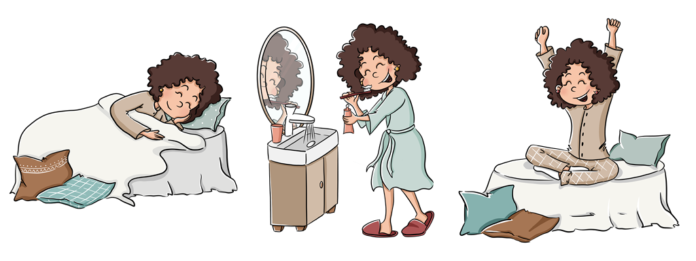The relationship between my bed and I has changed. Since semester’s end we’ve become closer. No longer the place where I flop, breathlessly, after a long day, only to force myself back onto two feet to (at the minimum) brush my teeth. The past week or so has been a revival I’ve relished — languid mornings between warm sheets with my face pressed towards my bedroom window as the rain patters. I don’t rush from this place. I don’t fall into it with despair. I’ve got time, and I’ve chosen to spend some of it in bed.
As romantic as these moments in my bed sound, my affinity for horizontal downtime is a universal Gen Z experience; co-opted by the unfortunate name, bed rotting. And while I’m grateful for my snuggly reconnection with my bed, I am wary of taking it too far. This “self-care” trend has been deemed as potentially harmful, leading to depression or other mental health issues if the behaviour becomes a pattern. Movement is key in upkeeping our mental, physical, and emotional health. So allowing yourself to stay in bed, while it is easy and relaxing, might do more harm than good. In no way do I want to resemble the tupperware I forgot in the Cascade office — I have little desire to rot. Too much of any good thing can be bad; at this point of my life I have welcomed moderation. In honour of that, I’ve compiled the ways that ensure that I do not rot.
Guilt-free relaxing: What’s the point of being lazy if I spend the entire time beating myself up? Instead of telling myself I should have been up at 8 a.m., or should have already done the million things I could have done, I fully allow myself to enjoy lazy, warm mornings. I’ll watch my show, guilt free. Conquering incessant mental chatter is no small feat, but allowing myself the mental space to be present makes getting up something I want to do rather than something I should or have to do.
Romanticize time alone: The hours in a day fly by when you have nothing on the agenda, and I’m not going to add tasks for tasks sake… but I will motivate myself with some romantic idealism. I’ll put on my comfy jeans and favourite cardigan to enjoy a latte at Oldhand with a good book. It’s a cool way to spend an hour or two.
Monitor your screen time: A tale as old as time, but it’s so real. The visual stimulus from our device is like a dopamine vacuum. How many devices do you have going at any given moment? Are you watching TV on your laptop while also scrolling on your phone? Are you relaxing, or dissociating? Be intentional about what you’re engaging with and be conscious of when you’re overloading your senses.
“Rot” creatively: You know, there are other things to do than consume… If you’re dying to binge watch some new releases, take up knitting and keep your hands busy while you do. Or bring a journal to your bedside and purge some cyclical thoughts. Maybe you can curate a playlist for a friend and offer it as a gift.
Boundaries: My phone does not have streaming apps. I deleted Netflix once I realized I was always watching Netflix, because I always have my phone. Call me old fashioned, but I’ve designated my living room as the place where I, get this, watch TV. Creating physical boundaries around my media consumption has made it easier to compartmentalize. Studies show that allowing your bed to be a place where you can eat or watch TV, messes with your sleep cues, the mental associations we have with rest.
Kiara Okonkwo is a writer and creative. She received a diploma in Screenwriting from Vancouver Film School and is pursuing her Bachelor of Fine Arts in Creative Writing and Media and Communication Studies. Kiara values self-expression and authenticity.


